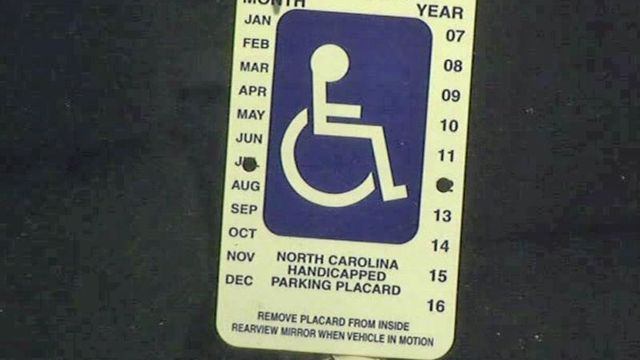Raleigh's pay-to-park rule helps curb handicapped placard abuse
For years, parking has been a sore spot for downtown Raleigh businesses, especially time-limited parking spaces taken up all day by vehicles with handicapped placards.
Posted — UpdatedFloye Dombalis said she watched it every day from her cash register at Mecca Restaurant on Martin Street.
“It was being abused. I think people were using them who were not legally supposed to,” she said.
Handicapped placards lined up, which prevented parking turnover. But Dombalis says there has been a transformation in recent weeks that she credits to the new parking stations. Now, all drivers must pay to park.
“You can usually find a parking space right on our street,” she said.
The old Raleigh parking ordinance was intended to protect the disabled, but it backfired with abuse.
Since 2006, a series of WRAL investigations found questionable use of the tags, including a woman who walked away gracefully in high heels and another using her father's placard for all-day, free parking.
“I think the early abuse was the combination of two things – one of convenience to be able to park close to where they want to go and also the fact that parking was free,” said Raleigh Parking Administrator Gordon Dash.
Under pressure from downtown businesses desperate for parking turnover, Raleigh city councilors took away the financial incentive when they installed pay stations. Those with placards can still park all day, but the stations now require that they pay.
Raleigh parking enforcement agent Chip Murphy says using the pay stations has been a learning process for visitors to downtown.
There are fewer vehicles with placards parking on downtown streets, he said.
Don Carter, owner of the Capital Bank building on Fayetteville Street, pushed for pay stations in the hopes that it would free-up short term spaces.
“As soon as they had to start paying, it went away,” Carter said. “The only group that ended up losing were those that were abusing the system with all day parking, using the placard as a front.”
Many with placards were not abusing the system, such as Gail Lashock. She spoke with WRAL News two years ago and said her priority was an accessible space.
“If we have to pay, we have to pay. That's my attitude, just like anybody else. But, I do need that spot,” she said.
The pay stations not only increased parking turnover. They've also increased revenue for the city. Dash says downtown meters averaged $8,200 a month. The 82 pay stations now in place average more than $24,000 for the same period. Raleigh plans tol more than double the number of pay stations to cover outlying downtown streets.
Parking administrators say many drivers with handicapped hang tags are migrating to areas where pay stations aren’t yet installed. On Wilmington Street near the North Carolina History Museum, five of seven cars parked there displayed placards on one recent afternoon.
Around the pay stations, though, it's a new world. Downtown business owners and drivers said they are seeing something they haven't seen in years – available parking.
Related Topics
• Credits
Copyright 2024 by Capitol Broadcasting Company. All rights reserved. This material may not be published, broadcast, rewritten or redistributed.






